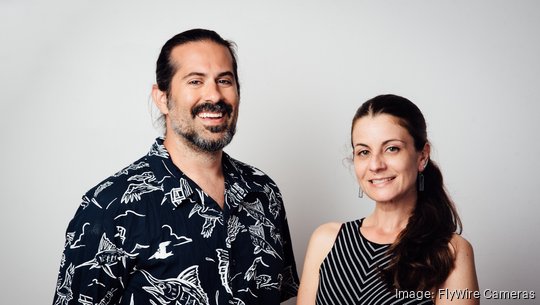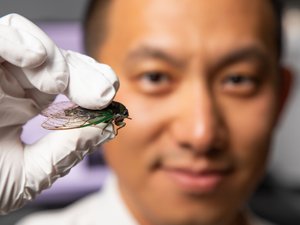
Lexington, Kentucky, might not seem like the first place for a startup in the fishing industry, but the founders at FlyWire Cameras have experienced no issues being located in a landlocked city.
The founders, Jacob Issac-Lowry and Sarah Alessi, began FlyWire in 2014 in Honolulu, Hawaii.
Issac-Lowry was a graduate student — studying robotics and autonomous navigation — at the University of Hawaii at Manoa, while working on miniature video systems on the side, starting in 2013. Alessi was working for the National Oceanic & Atmospheric Administration (NOAA) in a role where she helped respond to and rehabilitate marine turtles.
The two had been testing the miniature camera technology in various industries, such as health care and manufacturing before discovering the opportunities that lie underneath the world’s deepest waters — while tapping into Alessi's background in marine science and conservation.
“We actually found that in fishing, there was the greatest demand [and] the biggest market opening to move that technology into something that could be scalable, with the lowest barriers to entry,” Isaac-Lowry said.

To better explain how the technology works, Isaac-Lowry likened the apparatus that boats use to a body camera that a police officer would wear, but the boat “wears” it instead.
Using a combination of video, GPS and other sensors, the device can record a variety of data points that allow transparency into a traditionally murky marketplace. This allows the fishermen to meet compliance and enforcement regulations, among other cost-saving benefits, such as insights into labor efficiency, catch quality and catch efficiency.
Simply put: More data points can lead to more profits, while maintaining the viability of the seafoods’ sources.
“When you can do all that while managing [fisheries’] business risks that the technology creates, you end up with a really winning combination that we feel is poised to really transform this entire industry,” Isaac-Lowry said.
A big catch
Shortly after the company’s founding, the founders had another realization that their hardware component, which was the lifeblood of the startup, would be better served located on the mainland.
After looking at the normal suspects for tech on the West Coast, they decided to move the operation to Isaac-Lowry’s hometown of Lexington, after hearing about the city's Jobs Fund, which is a business incentive program for Fayette County. Its headquarters is located at 848 Nandino Blvd., Ste. R, in Lexington.
The company, which took part in the Endeavor Scale Up program in 2020, has a business-to-business (B2B) direct sales model that functions like a Software-as-a-Service (SaaS) product.
As of a recent date, FlyWire Cameras is actively working two fisheries — both on the West Coast with about 200 boats each — in the U.S., having worked with a total of seven fisheries in the country since its founding.
About a year ago, the startup landed an international client, Tri Marine Group, one of the world’s largest suppliers of tuna. The cameras have been installed in boats that are located off the coasts of Taiwan and Trinidad and Tobago. It had previously done work with fisheries located in Peru, Mexico, Indonesia and the Philippines.
The technology is currently installed in about five boats now, but the founders hope to be in about 40 by the end of 2024, with half of those run by Tri Marine.
FlyWire Cameras is raising a $750,000 bridge round between its seed round ($1 million) and future Series A. Isaac-Lowry said approximately half of the bridge money has been committed.
To date, the startup has raised around $3.25 million, with investors including Keyhorse Capital and Commonwealth Seed Capital, but a majority of its capital has been raised thus far out of state.










